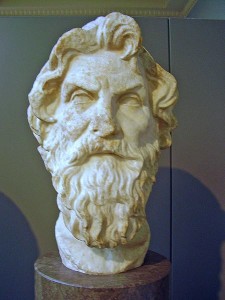 Antisthenes was a Greek Philosopher that lived from 446 to 366 B.C.E. He was known as the founder or forerunner or Cynicism even though Diogenes get the credit for being the first cynic philosopher. Diogenes was the student of Antisthenes. Antisthenes was a known orator in antiquities. He was also an acquaintance of Socrates. He has the credit of writing over sixty titles.
Antisthenes was a Greek Philosopher that lived from 446 to 366 B.C.E. He was known as the founder or forerunner or Cynicism even though Diogenes get the credit for being the first cynic philosopher. Diogenes was the student of Antisthenes. Antisthenes was a known orator in antiquities. He was also an acquaintance of Socrates. He has the credit of writing over sixty titles.Plato claims he was one present at the time of Socrates' death. It seems he had a disagreement and was no longer speaking to. Antisthenes believed in the purpose of ethics more than metaphysics. Antisthenes was an advocate of virtue. He lived an ascetic life and had a cultivation of wisdom. Antisthenes, like Socrates, observes ethical intellectualism. Like the Stoics, whom ensue the Cynics, he believes virtue is pursued through happiness.
Antisthenes was born into a rich family, by an Athenian father and a Thracian mother. Antisthenes was known as a nothos. The definition of a nothos is someone born of an illegitimate union. This means he was not an Athenian citizen. Started out as a student of Gorgias, but later began studying under Socrates. He had a really close friendship with Socrates. He was later noted as an older,respected member of Socrates' circle. After Socrates' death, Antisthenes was distinguished that he was Socrates' "most important follower."
There is little known about Anisthenes' life. We do know he was humorous and his life was all about asceticism. People say he was the first to double layer his cloak so he could sleep in it. He chose to live in poverty, even though he was the son of a wealthy man. With wearing his tattered clothing, he used his sense of humor to poke fun at the beliefs and mores of common Athenians. This practice would later be perfected by his student, Diogenes.
Antisthenes' ethical views are quite innovated and aren't just a repeat of Socrates'. Number one being virtue is in need for happiness, they are open to all. Number two is he separated morality and legality. The Cynics show us no regard for nomos. Nomos means both law and convention, whether cultural codes or legal regulations. By loosening the laws and virtue, Antisthenes set the bar for Diogenes and Crate to take more positions.
Antisthenes was abstinent from pleasure. He claims he preferred madness to pleasure. He says its dangerous and can cause precarious activities. He didn't want to become "enslaved" to pleasure and you lose the possibility to ever be completely free again. Antisthenes was very open abut the fact that he thought theoretical philosophy was completely useless. “Wisdom is a most sure stronghold which never crumbles away nor is betrayed. Walls of defense must be constructed in our own impregnable reasoning's,” a quote from Antisthenes about why he was anti- theoretical. He says he is all based on virtue.
No comments:
Post a Comment
Note: Only a member of this blog may post a comment.